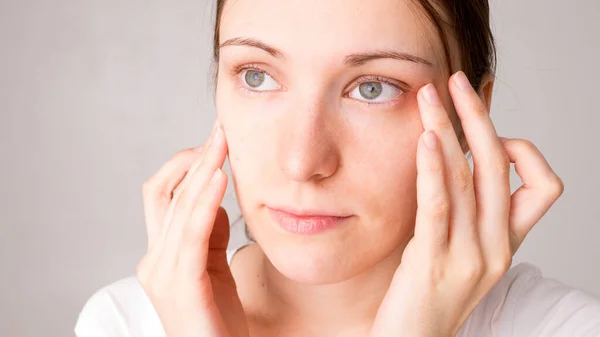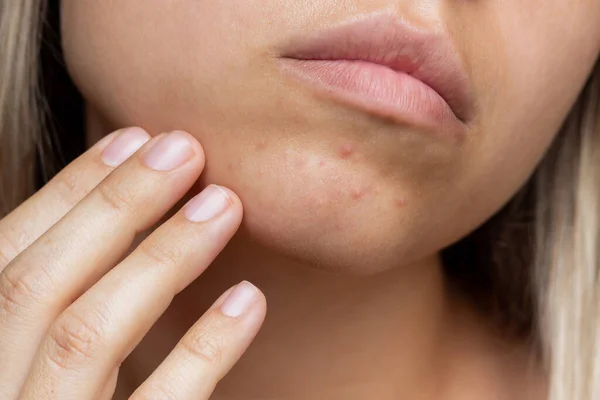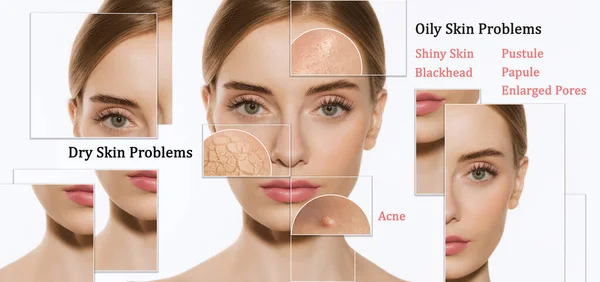What Causes Dry Skin on Face can vary from weather changes and harsh skincare products to underlying health conditions like eczema or psoriasis. The face a canvas of expression, a window to the soul, but sometimes it speaks of discomfort. Imagine the tactile discomfort of dry skin on this most expressive canvas.
It’s a puzzling paradox our face, the pinnacle of personality projection, marred by the vexing presence of dryness. Understanding the enigma behind the causes of dry skin on the face unveils a narrative of internal and external influences, a tale of environmental foes, and a labyrinth of skincare mysteries waiting to be unraveled.

What Causes Dry Skin On Face
Dry skin on the face can result from various factors, including environmental conditions, lifestyle choices, underlying health conditions, and skincare routines.
Environmental Factors
The environment plays a pivotal role in skin health. Harsh weather conditions such as cold, dry air or excessive sun exposure can strip the skin of its natural moisture, leading to dryness. Windy conditions can exacerbate this effect, causing further dehydration and flakiness.
Lifestyle Choices
Certain lifestyle habits contribute significantly to facial dryness. Inadequate hydration, excessive alcohol consumption, smoking, and a diet lacking in essential nutrients can all impact skin health. Additionally over-washing the face or using harsh soaps and cleansers can disrupt the skin’s moisture barrier leading to dryness.
Underlying Health Conditions
Several health issues can manifest as dry skin on the face. Conditions like eczema, psoriasis, hypothyroidism, and allergies can cause persistent dryness and irritation. These underlying health concerns often require specialized treatment to address both the symptoms and the root cause.
Skincare Regimen
Sometimes, the products used in skincare routines exacerbate dry skin. Overuse of exfoliants, not moisturizing enough, or using products with harsh chemicals can strip away the skin’s natural oils, leading to dryness and sensitivity.

Factors Contributing to Dry Skin on the Face
Factors Contributing to Dry Facial Skin
Dry facial skin can result from various factors, including environmental elements like low humidity, extreme temperatures, and prolonged exposure to wind and sun. Lifestyle choices such as using harsh skincare products, frequent hot baths or showers, and habits like smoking and excessive alcohol intake can exacerbate dryness.
Inadequate hydration, poor dietary choices, and certain health conditions like eczema, psoriasis, hormonal changes, and underlying issues such as hypothyroidism also play a role. Proper skincare routines and lifestyle adjustments can help alleviate and prevent dryness. Opt for gentle products and maintain adequate hydration for healthier, nourished skin.
Understanding the Mechanisms Behind Dry Skin
Dry skin, a prevalent issue, stems from various factors affecting the skin barrier’s function. This barrier, crucial for retaining moisture and fending off irritants, can suffer disruptions, triggering dryness. When this happens, the skin’s natural oils, like sebum, decrease, contributing to moisture loss.
External elements, such as harsh weather or excessive cleansing, exacerbate this by depleting moisture content. Inflammation plays a pivotal role in dry skin conditions, leading to heightened sensitivity and irritation, exacerbating the problem.
Prevention and Treatment Options
Discover Effective Prevention and Treatment Options for Healthier Skin: Learn about the importance of a dedicated skincare routine encompassing gentle cleansing, moisturizing, and sun protection. Embrace lifestyle changes such as adequate hydration, a balanced diet, and avoiding harsh products to promote skin health.
Explore medical interventions like prescription creams, dermatological treatments like microdermabrasion, and the identification and management of underlying health conditions for optimal skincare.
Home Remedies and Natural Treatments
Home remedies and natural treatments offer relief and nourishment using everyday elements found in your home. Incorporating humidifiers and moisture retaining techniques helps maintain optimal indoor humidity levels, preventing dryness and promoting healthier skin.
Embrace the goodness of natural oils like coconut oil and shea butter, renowned for their deep moisturizing properties, leaving your skin supple and hydrated. DIY face masks and gentle exfoliation methods, utilizing ingredients like honey, oatmeal, and yogurt, gently renew and rejuvenate skin, providing a radiant glow. Enhance your skincare routine with these holistic approaches for a naturally vibrant complexion.
FAQs
What are the main culprits behind persistent facial dryness?
Dry skin on the face can stem from various factors like harsh weather, excessive facial washing, underlying skin conditions, or even certain skincare products that strip natural oils.
How can I distinguish between regular dry skin and a skin condition causing facial dryness?
Usually, dry skin is temporary and linked to environmental factors. However, persistent dryness, redness, or flakiness might indicate conditions like eczema or psoriasis, warranting a dermatologist’s evaluation.
Can diet influence facial dryness?
Absolutely. Inadequate hydration and a lack of essential fatty acids or vitamins (such as A, C, and E) in your diet can contribute to dry skin. Ensuring a balanced diet and ample water intake can help maintain skin health.
Are there specific skincare ingredients to avoid if I have dry skin?
Yes, certain ingredients like alcohol, fragrances, and harsh exfoliants can exacerbate dryness. Opt for gentle, hydrating products with ingredients like hyaluronic acid, glycerin, or ceramides.
Can over-hydrating the face worsen dry skin?
Interestingly, yes. Over-moisturizing might disrupt the skin’s natural balance and trap dead skin cells, leading to clogged pores and further dryness. It’s about finding the right balance.
Are there lifestyle changes that can help combat facial dryness?
Absolutely. Protecting your face from harsh weather, using a humidifier, avoiding long hot showers, and incorporating a regular skincare routine can significantly improve facial dryness.
Can stress or lack of sleep contribute to dry skin on the face?
Indeed, both stress and insufficient sleep can impact your skin’s health. Stress hormones may affect your skin’s moisture levels, while inadequate sleep can hinder the skin’s ability to repair and rejuvenate.
How frequently should I exfoliate if I have dry skin?
Exfoliating can help remove dead skin cells, but for dry skin, it’s best to limit it to once or twice a week using a gentle exfoliant to avoid further irritation.
Can hormonal changes cause facial dryness?
Yes, hormonal fluctuations, especially during menopause or pregnancy, can impact skin moisture levels, potentially leading to dryness.
When should I seek professional help for my facial dryness?
If home remedies or over-the-counter products don’t alleviate dryness, or if your skin shows signs of infection or severe discomfort, it’s advisable to consult a dermatologist for a proper assessment and treatment plan.

conclusion
In crafting a dedicated winter skincare routine for dry skin, the focus on hydration, protection, and nourishment emerges as paramount. The incorporation of rich, emollient products like hydrating serums, thick moisturizers, and protective barriers not only safeguards the skin from harsh winter elements but also nurtures its health and resilience.
By prioritizing gentle cleansing, consistent moisturization, and targeted treatments, this skincare regimen strives to restore and maintain the skin’s moisture balance, fostering a radiant and supple complexion despite the challenging winter conditions. Ultimately, the key lies in embracing a holistic approach that caters specifically to dry skin’s needs, ensuring a winter season filled with comfort, rejuvenation, and a healthy glow.

